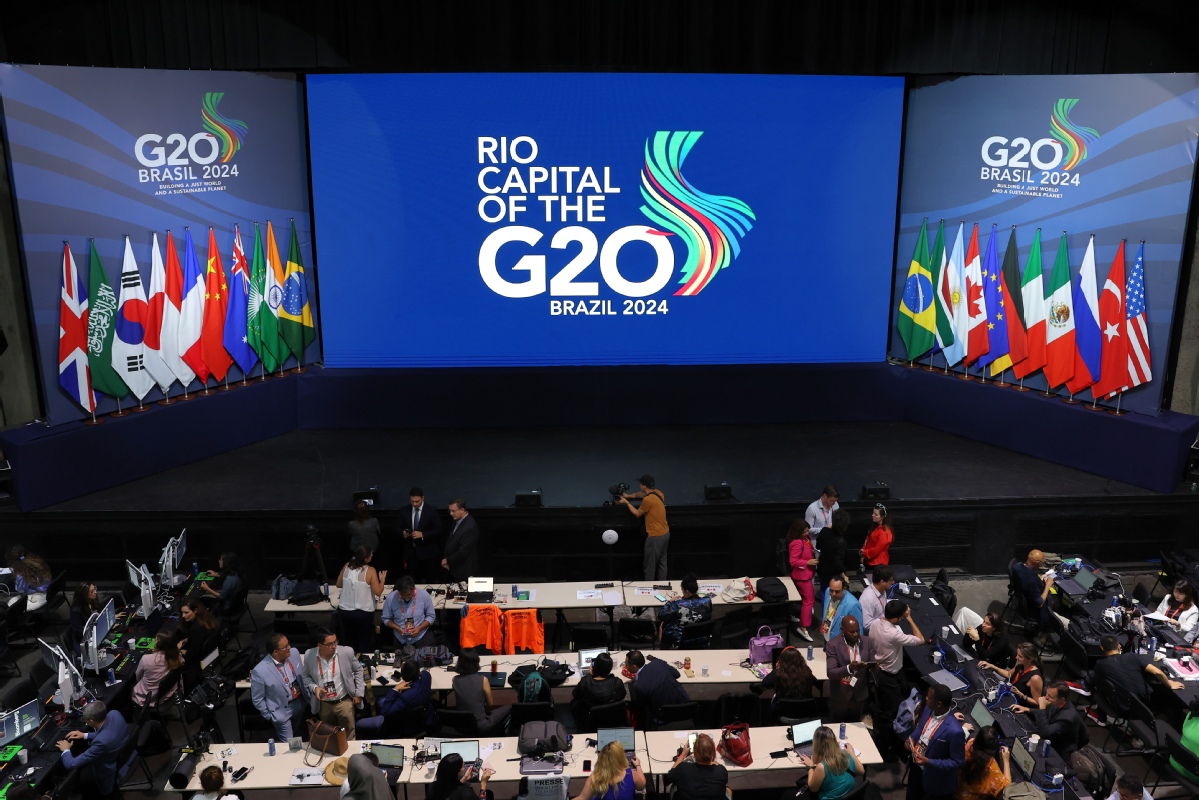Nov 20, 2024, 17:00
 Reporters work in the G20 International Media Center in Rio de Janeiro, Brazil on Monday. [Photo by Wang Zhuangfei/China Daily]
Reporters work in the G20 International Media Center in Rio de Janeiro, Brazil on Monday. [Photo by Wang Zhuangfei/China Daily]
On Nov. 15, Chinese President Xi Jinping gave a written speech at the APEC CEO Summit in Lima, Peru.
Focusing on the question of where the Asia-Pacific economy will be going, Xi profoundly summarized the successful experience of the Asia-Pacific development, proposed a universally beneficial and inclusive economic globalization, and expounded on the significance of China further deepening reform across the board to advance Chinese modernization. His remarks has drawn a new blueprint for the common development of Asia-Pacific.
Asia-Pacific economies are deeply woven into the fabric of economic globalization. They are now an interdependent community with common interests and a shared future.
Despite the unbridled unilateralism and protectionism, and the increasingly fragmented world economy, the overall trend of economic globalization remains unchanged.
New technological revolution and industrial transformation are getting more profound, and the world is moving faster to embrace a digital, green and smart economy. All this is building up powerful energy for further expedition of economic globalization down the road.
APEC should steer economic globalization in the right direction. It should see to it that economic globalization generates more positive outcomes and is taken to a new phase that is more dynamic, inclusive and sustainable.
To promote a universally beneficial and inclusive economic globalization to the benefit of various countries and communities, Xi said APEC should take innovation as the driving force for stronger growth of the world economy, keep pace with the times and reform the system of global economic governance, and always take the people-centered approach and seek to settle imbalances in development. This offers important guidance for building consensus for Asia-Pacific development and creating a prosperous future.
Under new circumstances, sci-tech innovation is the source of productivity. It is important to make full use of artificial intelligence and other emerging technologies to help developing countries with their capacity building in science and technology and promote global flow of knowledge and technologies.
It is important to follow the principles of "plan together, build together and benefit together" to ensure that the global economic governance system better reflects the new reality of the world economic map. The representation and voice of the Global South should be enhanced continuously, and all countries should be ensured of equal rights, equal opportunities and equal rules in conducting international economic cooperation.
True development means common development of all countries. APEC should ensure people's well-being while seeking economic growth, and foster a development environment that is inclusive and beneficial for all. It should help expedite the implementation of the 2030 Agenda for Sustainable Development and promote balanced and full development of all countries.
Over the past decades, Asia-Pacific economies have maintained robust growth and created the remarkable Asia-Pacific miracle. The success of the Asia-Pacific is due to regional countries' firm commitment to peace and stability in the region, to their continuous practices of true multilateralism and open regionalism, and to their deep faith in the trend toward economic globalization as well as mutual benefit and mutual success.
The Asia-Pacific should remain the locomotive of economic globalization in the future. While further burnishing the Asia-Pacific hallmark of openness and inclusiveness, it should make new brand-building efforts to foster a green and digital Asia-Pacific, and build an Asia-Pacific community with a shared future.
China's development is inseparable from the Asia-Pacific, and it will in turn further benefit the region. China is an engine and propeller for regional cooperation in the Asia-Pacific. It is the largest trading partner of the 13 APEC economies, contributes 64.2 percent of the region's economic growth, 37.6 percent of the growth in goods trade and 44.6 percent of the growth in services trade.
According to the third plenary session of the 20th Central Committee of the Communist Party of China held in July this year, China will complete over 300 important reform measures in the next five years. This will provide not only strong impetus for China's economic and social development, but also more opportunities for global development.
China will deepen reform comprehensively, advance high-quality development, stay firmly on the path of green development and build new, open and higher-standard economic systems, to provide robust momentum for the world economy, lead the efforts to improve the performance of the world economy, be an important force for global green transition and share China's development opportunities with the world.
This is not only China's firm commitment to promoting Asia-Pacific cooperation and building an Asia-Pacific community with a shared future, but also China's forward-looking vision for the world, the future, and common development.
Asia-Pacific economies should keeping abreast of the trend of the times, enhance their solidarity and cooperation, stand up together to the global challenges, and form a mighty force for the common prosperity of the world and a brighter future for humanity.
xinhua
Community login






Add a comment